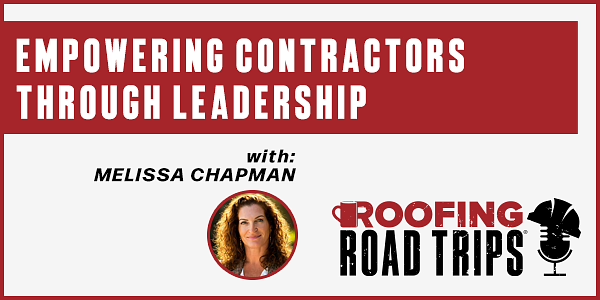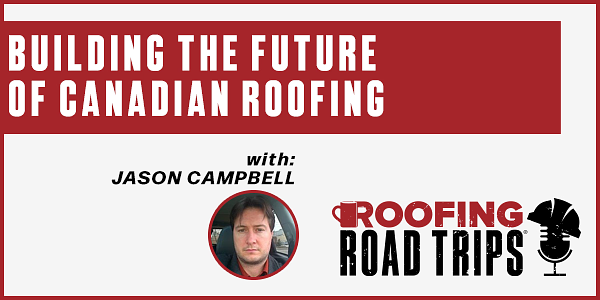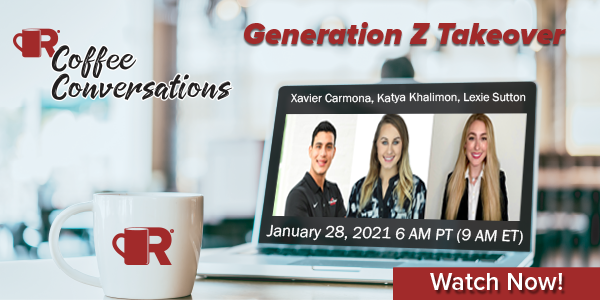Empowering Contractors Through Leadership - PODCAST TRANSCRIPT
July 2, 2025 at 2:00 p.m.Editor's note: The following is the transcript of a live interview with Melissa Chapman from The GLO Group. You can read the interview below or listen to the podcast.
Intro: Welcome to Roofing Road Trips, the podcast that takes you on a thrilling journey across the world of roofing. From fascinating interviews with roofing experts to on-the-road adventures, we'll uncover the stories, innovations and challenges that shape the rooftops over our heads. So fasten your seat belts and join us as we embark on this exciting roofing road trip.
Heidi Ellsworth: Hello and welcome to another Roofing Road Trips from RoofersCoffeeShop. This is Heidi Ellsworth and we are here today, I am here today with one of my favorite people in the roofing industry, someone who I've worked with, who we have done projects together and who is doing something so cool and forward thinking that I just get excited talking about it. And that is I am today with Melissa Chapman of The GLO Group. Hello, Melissa.
Melissa Chapman: Hi, Heidi. I'm so happy to be here.
Heidi Ellsworth: I'm so happy. I love our conversations and I especially love what you are doing. So let's start out with an introduction and tell us a little bit about The GLO Group.
Melissa Chapman: Sure, of course. Well, first of all, thank you so much for having me. I am Melissa Chapman, co-founder of The GLO Group. We specialize in leadership development and business scaling for contractors, particularly those running roofing businesses and other trades. Our focus is on helping contractors build strong self-sufficient teams so they can move from being in the weeds of daily operations, as we know that happens often, to leading their businesses with vision and confidence. At The GLO Group, we really believe that leadership isn't just about managing people, it's also about creating a culture that drives growth. And so that's why we created what we're talking about today, which is the LDR Accelerator, a leadership and business development program designed specifically for contractors who want to scale their business sustainably and reclaim their time and energy.
Heidi Ellsworth: I tell you what, this is needed more than ever. You and Monica have seen such a need in the industry and really put your finger right on it, on creating some great resources. So let's start out overall with what you see are the biggest challenges that contractors are facing today that, we see it, it's impacting their leadership and their ability to scale their business. What are you seeing, Melissa?
Melissa Chapman: Well, contractors today are dealing with a few major roadblocks when it comes to scaling their business. One could be owner dependency, which is where most roofing businesses or business owners start out as skilled technicians and what the problem there is they still feel like they have to do everything themselves, which then limits their growth and can lead to burnout. A second thing that we see is talent and team development. Finding and keeping skilled workers obviously is a very big challenge for the industry. Many contractors struggle with leadership skills that would allow them to delegate effectively and build a team that takes ownership of their roles. A third thing that we're seeing is lack of systems and processes. A lot of smaller contractors run their businesses in their heads instead of on paper or in systems. We see that, so that-
Heidi Ellsworth: Yes.
Melissa Chapman: ... that makes scaling chaotic and unpredictable, right?
Heidi Ellsworth: Yeah.
Melissa Chapman: And finally, that work-life balance that we all seek. Oftentimes, these contractors are putting in over 60 hours a week just to keep things running and that leaves little time for family or personal health. So the LDR Accelerator is really designed to tackle these challenges head on.
Heidi Ellsworth: Yeah. Wow. I think you've just hit it right on the head in that this is what contractors and not just contractors, small business owners, large business owners, you name it, we're dealing with it all the time. And one of the things I love, Melissa, is you became a certified coach and that just, to me, shows so much commitment in really what you're seeing in the industry and what is needed. What are some of the things, with you launching the LDR Accelerator, talk to us a little bit how the coaching and overall your recommendations to the customers, your clients, to deal with some of these challenges you just talked about.
Melissa Chapman: Sure. Well, first, we help them shift their mindset from doer to leader and that means transitioning from working in the business to working on it. So as part of this process, some few key strategies we focus on include building leadership skills. We work with contractors on how to create accountability within their teams so they're not the only ones solving the problems. We work with them on delegation and systems and help them put the right systems in place so they can confidently step away from daily operations without everything falling apart. And finally, we work with time and energy management. We show them how to structure their schedule so that they can focus on growth, not just grinding through tasks. Our coaching certification has really helped us prepare us to be a partner in that journey and ultimately our coaching helps them develop leadership habits that make scaling smoother and more sustainable.
Heidi Ellsworth: Yeah, it is. It's about the habits. It's about finding that balance, which, boy, I can relate to that so much all the time. And I know we've all gone through that. First of all, I love what you're doing with this LDR Accelerator. I would love for you to walk us through the features of the program. Let's walk through that so people have a little teaser on what they can expect.
Melissa Chapman: Absolutely. So the LDR Accelerator is a one-year commitment program. It's an annual program, annual commitment. It's designed to fit the schedules of busy contractors. So here's how it works. We have monthly leadership coaching. Those are live coaching sessions to develop leadership and strategic thinking, both for the owner and for their leadership team. We offer practical business playbooks, which are step-by-step guides on hiring, delegation and scaling operations. We have accountability and peer support, so it's a community of like-minded contractors who hold each other accountable. You have peer cohorts and we bring in subject matter experts monthly to address specific challenges that you can find only in a contracting environment.
Melissa Chapman: Contracting businesses are often very different from other small businesses because you have those in the field and those in the office and trying to collaborate between the two entities of the business can be challenging. We offer mobile-friendly learning, so content is accessible on the go so contractors can learn in their trucks between jobs if they need to. And we have quarterly planning sessions, which are structured check-ins to ensure they stay on track for business growth and so much more. And it's really built specifically for contractors who don't have a lot of extra time but need a clear path to scaling their business while regaining control of their lives.
Heidi Ellsworth: Regaining control of your life, what a concept. I love that.
Melissa Chapman: Right.
Heidi Ellsworth: I love that. Well, when you talk about peer groups, I've just seen the power of peer groups really helping each other out. You're also talking about expert speakers and motivational speakers. Can you tell us a little bit more about that, 'cause that's really interesting?
Melissa Chapman: Sure. We're going to bring in contractors that have already done what these contractors are trying to do. So they have been through the challenges that these contractors are facing and it'll be specific to challenges. Whether it's estimating or how to manage their assets better, all of these elements that really impact their top and bottom lines. In addition, we're going to be having experts, for instance, how to leverage AI to really scale your company and other technology to really incorporate into your business to make it more efficient, effective and profitable. So those are just some of the examples. We'll have marketing people, we'll have from all different elements of the business come in to really help them develop a thorough and effective plan.
Heidi Ellsworth: Yeah. We've always heard from here contractors love to hear from contractors, so I love the idea of bringing contractors who have gone through and bringing them in to really speak to these contractors who are going, "Yeah, that sounds great, but is it really possible?" "Yes. Look, here it is right here in front of you." I love that. And as you are looking at it with emphasizing the leadership development as a key business growth, I'm interested too, Melissa, on how do you see that balance between the personal advancement, taking care of yourself and your things and the organizational success? And like you said, you're not talking just leaders, you're talking to the whole company. How do you balance all that?
Melissa Chapman: Well, that's a great question. It's something a lot of business owners struggle with, myself included. The truth is, business growth and personal development go hand in hand. The stronger the leader, the stronger the team and the stronger the business. We encourage contractors to think about leadership, not just something that they do at work, but as a personal skillset that impacts every area of their life. When they become more effective leaders, they're able to communicate better, reducing stress and misunderstandings. They're able to delegate more, freeing up time for family and personal interest and they're able to develop their team so they aren't carrying all the pressure alone. When leaders grow, the business follows.
Heidi Ellsworth: Yeah. And I think really, other people in the business, then you see that as an example. I think a lot of times when you're not letting go, when you're holding onto everything and not allowing the people who are working with you to take on responsibilities, to elevate, that isn't good for the culture either. That is discouraging for a lot of the employees.
Melissa Chapman: Certainly is. It certainly is.
Heidi Ellsworth: Yeah. Wow. When you're talking about work-life balance, I just think this is really interesting because you and I both have been doing this for quite a while and finding that work-life balance is somewhat of a trick. But I think it's also some people like to work more, some people like to work a little bit less, they've got other things going in their life. So really, how do you help the company as a whole to find their own space, find their own stride and that work-life balance that really works for them, because not everybody's the same?
Melissa Chapman: That's true. And one of the biggest myths is that balance means doing everything equally. And the reality is balance comes from setting clear priorities and boundaries. That's really where balance comes from. Most contractors we work with have been stuck in grind mode for so long that they've forgotten what life outside work looks like. They're just so in it. And in the LGR Accelerator, we help them create a leadership structure that gives them time back. Whether that's evenings with their families or weekends off for the first time in years, the goal is to build a business that supports your life, not one that consumes it. And that starts with great leadership.
Heidi Ellsworth: Yeah, it really does. And putting that, can you give us some examples, like you said, some of the contractors that you worked with and really how this has helped them change their business and their lives?
Melissa Chapman: Absolutely. We have one contractor, as an example, they were doing, this particular organization, the leader was making all of the decisions. And what was happening is there was a resentment building up within the leadership team because they felt that they weren't being heard or seen. There wasn't an opportunity for that and they had some really good ideas and they didn't feel that there was a space for them to share those ideas. When we opened that up and created that space, they were able to not only improve many of their processes, they were able to identify people that perhaps were in the wrong position and needed to be worked into a different kind of position that really spoke to their strengths.
Melissa Chapman: And we also were able to identify some people that otherwise would not have been noticed as potential future leaders that could be developed and when you're trying to strengthen your bench so that you can have a succession plan. So that in itself was a huge win, but what also came out from it was as a result, because it became more team decisions, now granted, obviously it always falls on the owner or the leader. Ultimately, there is one throat to choke, if you will.
Heidi Ellsworth: Yeah.
Melissa Chapman: However, when you have a team-led company, what you find is there's more collaboration and ownership. So therefore, these folks were coming to the table with cost-cutting ideas. They were coming to the table with ways in which to improve the customer experience and therefore their margins increased and their customer retention improved and ultimately their revenue and their profitability went up. So it was a win that came from just developing the team from within. It had a direct impact to their top and bottom lines.
Heidi Ellsworth: Right. The team is so important and letting them find their ways and coming together, but it's not always easy either.
Melissa Chapman: No, it's not.
Heidi Ellsworth: So what are some of the tools that you really offer through the LDR Accelerator for that team building? Is there any examples that you can give?
Melissa Chapman: Well, sure. We have a monthly coaching session with your leadership team, so the leadership team that you have can bring a challenge that they're faced with and we will help coach them to find a solution that works for everyone. And so that is an amazing way to identify, okay, for instance, we're having a hard time, for instance, tracking how and when our prospects are converting into leads or converting into sales, sorry, do we have a sales process? Is that being followed?
Melissa Chapman: Is it consistent? Who's doing a really good job and who isn't? What can we do to collaborate to improve upon that? Or, this guy's killing it over here and this guy isn't. What's the challenge? How do we fix it? Working together to solve these challenges? That's just one example. Another example could be, I have someone in our crew that has an attitude issue. How do we handle that? One foreman wants to handle it this way and another foreman would handle it another way. How can we leverage our strengths and leverage all of the wisdom and experience that the rest of the team has to turn a negative into a positive?
Heidi Ellsworth: Yeah, I think that's powerful right there. I love how you're saying, "This salesperson is doing a great job. How can we use what they're doing, the processes that are in place that are seeing success?" Same thing when you're looking at the foreman. And Melissa, you were working in a rough and tough industry, right?
Melissa Chapman: Mm-hmm.
Heidi Ellsworth: And so a lot of what you're bringing is relatively new, but I've seen this change, as our industry, we are talking more about this. What are you seeing that way?
Melissa Chapman: Absolutely. I think more people are becoming aware that, for instance, your laborers, your technicians, they're not going to leave you for a dollar to the guy down the road if you have a culture that allows them to feel seen and heard. If they understand that there's an opportunity for growth, if they feel like they're being cared for and their family's being cared for, they're not going to leave you over 50 cents an hour. That's not going to happen. They may come to you and say, "Hey, did you know..." And that can be an opportunity for you to say, "That's a really good point. Do they offer this, this and this and this that we offer you as added value?" It creates an opportunity to bring value beyond the dollar. People want to feel like they're part of something. And when you create a culture that allows people to feel like they have a voice that they can contribute and make a difference and that they're part of something bigger than themselves, magic happens.
Heidi Ellsworth: Yeah. Yeah. My brain's going, "Waah!" Because as you're talking, when you think about there's a lot of uncertainty in the world right now. No matter how you look at it, there's definitely some uncertainty out there and creating that culture within your company of security of able to speak your mind but in a very professional, respectful way, all of those things do... People are looking for that security and that openness, I would say, in a company culture and so that really starts with leadership. And if you and I have had this conversation so many times, but really, your LDR Accelerator is putting into place the leadership that is going to set examples to build and to create this culture of... Nothing's totally secure, so when I say security, I'm like, that's a little bit probably too much, but that culture of-
Melissa Chapman: It's a safe environment. It's a safe environment for you to speak your truth in a very respectful way and you're coming from a place of you want to improve what's happening.
Heidi Ellsworth: Right. Right. Okay. Let's just combine that and look at that in the sense of the labor shortage right now. Like I said, a lot of uncertainty, even though the roofing industry continues to rock and do well. As you're looking at people bringing this LDR in, LDR Accelerator, how do you see that helping with that labor shortage and some of these key issues in the industry?
Melissa Chapman: Well, I think when you create a strong company that has a real solid sense of who you are and what you stand for and that everyone within the organization provides value, your employees then become your recruiters. They're going to tell their friends and family how amazing their employer is and , "Oh, my gosh, you should come work here! They really care about you. They really want to see you succeed. They have the tools in place to help you succeed. And if they don't, they'll figure out how to get the tools in place to help you succeed." And I think when as an owner of a company you have a vision for yourself and for your company, well, so does everyone else.
Melissa Chapman: And really understanding what everyone's personal vision is and creating an atmosphere that encourages and supports the fruition of that will just spread like wildfire organically. And then you look at as you're interviewing people, when they understand who the company is that they're looking to work for, the younger folks, that's what's really important. They want to know what's important to you as an organization. Where are you putting your money? How do you care about your community? How do you show that? How do I fit into that? That's what they're looking for. So if you don't have that culture dialed in, you're not going to recruit the talent that you want and you're not going to retain the talent that you have.
Heidi Ellsworth: And we're seeing this over and over again. Just like you said, you've seen this in really successful contractors, they have these core values and a lot of it is around community engagement. It's around giving back and that is what is so important to this next generation. They want to-
Melissa Chapman: Oh, absolutely.
Heidi Ellsworth: ... know that and mentorship.
Melissa Chapman: Yes, mentorship is key. How can I continue to grow and learn? What is your plan for me? What kind of support do you offer so that I can continue to learn and grow? There are some folks that are okay with doing the same thing day in and day out and we all need those people and we love them.
Heidi Ellsworth: Yes.
Melissa Chapman: And this younger generation, they don't like to sit still for long. So giving them opportunities to continue to enhance their skill set will pay off in spades.
Heidi Ellsworth: Yeah, I think this is great. And as you're looking, just to give people, I know you went through already what that looks like of walking us through the features of the program, but let's talk just a little bit about, "Okay, I'm listening to this. I need help. I know I need help." How does a contractor who is already thinking, "I have no time. I am so stuck in my work business that I have no time to do this," how do they make that step, Melissa? How do they pick up the phone and know that this is the stairway to that better place?
Melissa Chapman: Well, first they have to make a decision. What's the risk of not doing it?
Heidi Ellsworth: Right.
Melissa Chapman: What's at risk if you don't pick up the phone or go to the website to register, you're going to have the same result. What was Albert Einstein saying? Doing the same thing over again and expecting a different result is the definition of insanity, something to that effect.
Heidi Ellsworth: Exactly.
Melissa Chapman: So if you want to see change, you have to be the change first. And you have to commit, we're asking for 12 to 15 hours a month of your time to really commit to your business so that you can then gain double, triple, quadruple that time back a month. So it's an investment in yourself and it's an investment in your company and it's investment in your team and that's how you really have to look at it. And so for the contractor that's like, "I don't have time for this," I will call BS, because you do make time for the things that are important to you and we all have the same number of hours a day. And so if other contractors can do it, why can't you?
Heidi Ellsworth: Yeah, so true. So true. One thing that I just want to point out and I would love for you to comment on is you have been in the roofing industry now 20, 25 years?
Melissa Chapman: Oh, my gosh, it's going to be 25 years.
Heidi Ellsworth: 25 years. So you have involved on all levels on working with contractors, manufacturers, distributors, you name it. Plus and I know we mentioned this at the beginning, but I just think this is really important to touch on again, you and your team all went out and Monica, your co-founder, went out and got your coaching certification. So talk just a little bit about how that experience in roofing really understanding, 'cause I always say work with people who understand roofing, your experience in roofing and your now with this certification in coaching and all the time and I know effort that you put into that, speaking of taking time out of your life to do something, how do those come together to really create this LDR Accelerator and really deliver something pretty unique and special?
Melissa Chapman: Well, firstly, I love this industry with all my heart. Otherwise, I wouldn't have committed 25 years of my life to it. I do love the roofing community and it is a community and I feel like it is a community. And part of why we developed LDR Accelerator is because we want to give back to this community that has been so good to me and my family and I've met lifelong friends in this industry, you included, right?
Heidi Ellsworth: Yeah.
Melissa Chapman: So what's unique is that first of all, we understand the whole cycle from cradle to grave when it comes to the process of installing a roofing system, so from sourcing the raw material all the way to sending out that warranty to the customer. So we understand everything that goes into what these contractors face. Whether it's related to materials related to insurance, related to installers, related to all different kinds of roofing systems, we're pretty well versed in that. So we can speak the language and we also understand the challenges with hiring and retaining talent. We understand the challenges within Spanish-speaking communities, the hierarchy that exists within that community. We understand the challenges with hiring veterans or incorporating more women into your crews and all of those things. We get it.
Melissa Chapman: And so that combined with the coaching certification, what makes us unique is that anybody can say that they're a coach. However, we actually have been certified as coaches. And what's different is that we are your partner in unpacking stuff with you to help you elevate. We're not going to tell you what to do. We're going to help you figure out what is best for you and your business. We're not here to tell you, "This is the only way to do it." We're here to help you figure out what's going to work for you. These are all these resources that are available. We're going to educate you. We're going to give you access to a community of supporters and cheerleaders and you name it and you're going to be led by people that really just want what's best for you as an individual.
Heidi Ellsworth: And your company.
Melissa Chapman: And your company-
Heidi Ellsworth: And your company.
Melissa Chapman: ... 'cause they're both related.
Heidi Ellsworth: Yeah, it all goes together. I love that answer. That was absolutely awesome. It's exactly what people need to hear too, because too often a lot of this is just a little scary and you just brought it right home. Man, I love that. So, okay, now that we've got everybody ready to go, how do they get involved with LDR Accelerator? How can they register? What's the next steps?
Melissa Chapman: So we're incredibly excited about the next phase and our goal is to help as many contractors transform their leadership and business operations in the next year. So you can register for our next cohort, which will begin in April, middle of April and so you can register at ldraccelerator.com. Spots are limited because our cohorts, we keep smaller groups. So the sooner you do it, the better. And so yeah, interested contractors can learn more and apply at the website. And if you're a contractor who's ready to step into real leadership and scale your business without burning out, we'd love to have you in the program.
Heidi Ellsworth: That sounds awesome. You can find all this information too, on The GLO Group directory on RoofersCoffeeShop. So go check it out. I'm telling you, this is game changer for a lot of businesses. And you know what? With all the uncertainty, with the craziness that's going on, there is no better time than to differentiate your business by your leadership and by your team and your culture. This is probably the most important time ever to be looking at this. So Melissa, wow. Thank you so much. I'm inspired.
Melissa Chapman: Aw, thank you. I really appreciate it and I always love talking to you, Heidi.
Heidi Ellsworth: I love it. I love these conversations. Well, I'm excited. We're going to have you back and we'll talk again after your first cohort and that's going to be in April. So we'll be having you back, Melissa, 'cause I want to hear all about it.
Melissa Chapman: Awesome. Thanks so much.
Heidi Ellsworth: Thank you and thank you all for listening. This is the kind of stuff that will change your business, change your life, so be sure to go to The GLO Group directory, get the information, get signed up. I'm telling you, this is exactly what we all need right now. And also, check out all of our podcasts under the Read Listen Watch navigation. Be sure to subscribe and set those notifications so you don't miss a single episode. We'll be seeing you next time on Roofing Road Trips.
Outro: If you've enjoyed the ride, don't forget to hit that Subscribe button and join us on every roofing adventure. Make sure to visit rooferscoffeeshop.com to learn more. Thanks for tuning in and we'll catch you on the next roofing road trip.























Comments
Leave a Reply
Have an account? Login to leave a comment!
Sign In